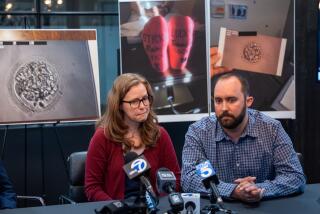Babies Born to Be Donors Raise Concerns
- Share via
CHICAGO — In a growing practice that troubles some ethicists, a Chicago laboratory helped create five healthy babies through in vitro fertilization so that they could serve as stem-cell donors for their ailing brothers and sisters.
The infants, from different families, were screened and selected when they were still embryos to make sure they would be compatible donors. Their siblings had leukemia or a rare and potentially lethal anemia.
This is the first time embryo tissue-typing has been done for common disorders such as leukemia that are not inherited, and the results suggest that many more children than previously thought could benefit, said Anver Kuliev, a Chicago doctor who participated in the research.
“This technology has wide implications in medical practice,” Kuliev said Tuesday at a news conference.
The Chicago doctors said the healthy embryos that were not matches were frozen for potential future use. But some ethicists said such perfectly healthy embryos could end up being discarded.
Valparaiso University professor Gilbert Meilaender, a member of the President’s Council on Bioethics, called the practice “morally troubling.”
The cases involved prenatal tests called pre-implantation HLA testing, pioneered at Chicago’s Reproductive Genetics Institute.
The tests are an offshoot of pre-implantation genetic diagnosis, which has been done for more than 1,000 couples worldwide to weed out test-tube embryos with genetic diseases such as Down syndrome, or, more recently, for sex selection.
The cases, reported in today’s Journal of the American Medical Assn., involved nine couples who submitted embryos that underwent tissue-typing tests in 2002 and 2003. Five had infants considered suitable donors.






